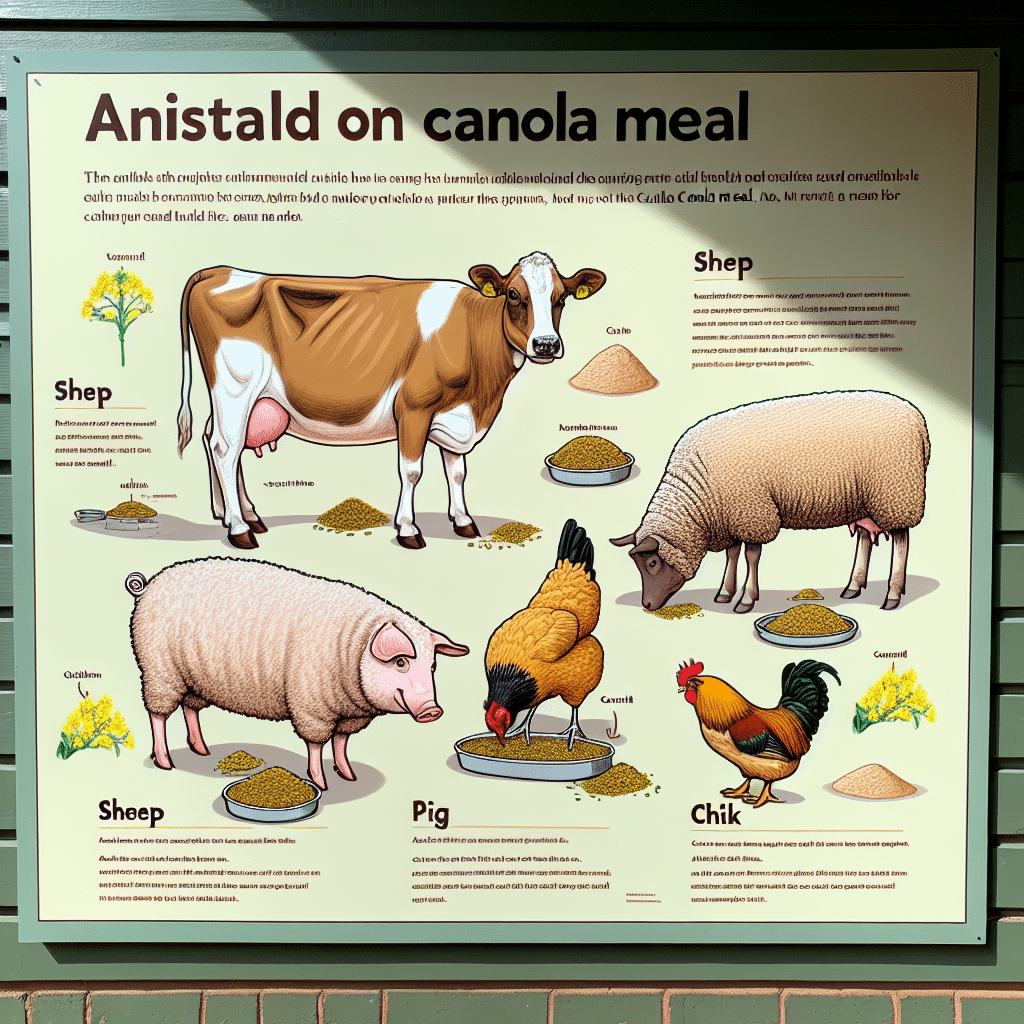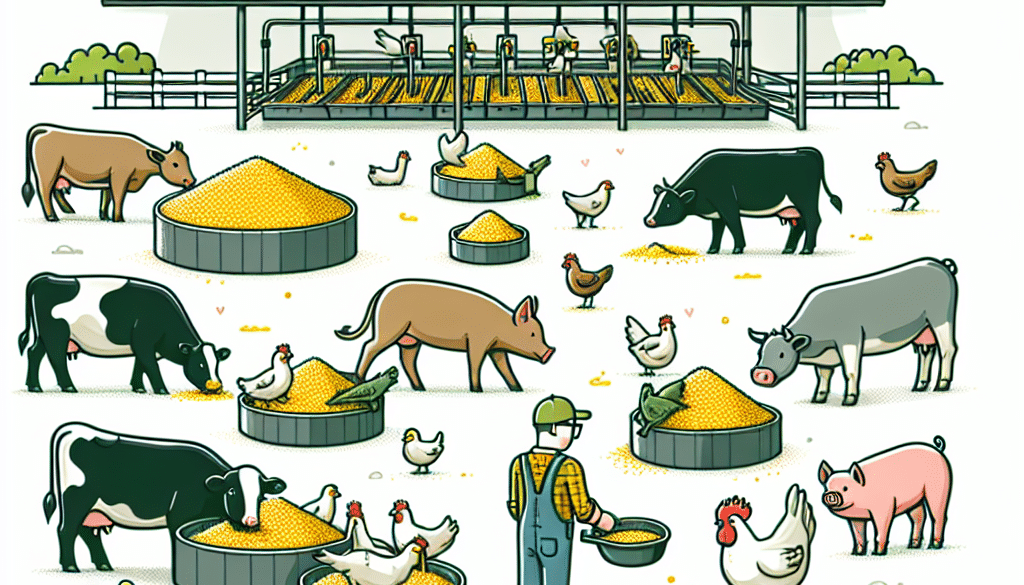What Animals Eat Canola Meal?
-
Table of Contents
- Canola Meal as Animal Feed: Who’s Eating It?
- Introduction to Canola Meal
- Livestock That Benefit from Canola Meal
- Case Studies and Research on Canola Meal Consumption
- Benefits of Canola Meal in Animal Diets
- Challenges and Considerations
- Conclusion: The Versatile Value of Canola Meal in Animal Feed
- Discover ETprotein’s High-Quality Protein Products
Canola Meal as Animal Feed: Who’s Eating It?

Canola meal, a byproduct of canola oil production, is a highly nutritious feed ingredient widely used in animal diets. Its popularity stems from its excellent protein content, essential amino acids, and relatively low cost. Understanding which animals can benefit from canola meal can help farmers and feed manufacturers make informed decisions about their feed formulations. This article explores the various animals that consume canola meal and the benefits it offers to each.
Introduction to Canola Meal
Before diving into the specifics of animal diets, it’s essential to understand what canola meal is and why it’s a valuable feed ingredient. Canola meal is produced during the extraction of oil from canola seeds. After the oil is removed, the remaining seed material is processed into a meal that is rich in protein and fiber. It’s known for its balanced amino acid profile, which includes high levels of methionine and cysteine, making it an excellent supplement for various livestock diets.
Livestock That Benefit from Canola Meal
Canola meal is a versatile feed ingredient suitable for a wide range of animals. Here are some of the primary consumers:
- Dairy Cattle: Dairy cows require a protein-rich diet to maintain milk production. Canola meal is an excellent source of rumen-degradable protein, which helps support milk yield and quality.
- Beef Cattle: Beef cattle can also benefit from the inclusion of canola meal in their diet, particularly during the finishing phase, as it helps promote growth and muscle development.
- Poultry: Chickens, turkeys, and other poultry species often have canola meal included in their feed to provide essential amino acids necessary for growth and egg production.
- Swine: Pigs can digest canola meal efficiently, and it serves as a valuable protein source for both growing pigs and sows.
- Sheep and Goats: Canola meal can be a part of small ruminant diets, contributing to weight gain and wool or milk production.
- Aquaculture: Fish and other aquatic species are increasingly being fed diets that include canola meal as a sustainable alternative to traditional fishmeal.
Case Studies and Research on Canola Meal Consumption
Several studies have been conducted to evaluate the effects of canola meal on animal health and productivity. For instance, research in dairy cattle has shown that replacing a portion of soybean meal with canola meal does not negatively impact milk production and may even improve milk protein content. In poultry, canola meal has been successfully used as a partial replacement for soybean meal, with no adverse effects on growth rates or feed efficiency.
In aquaculture, canola meal has been tested as a protein source in diets for species like salmon and trout. The results indicate that canola meal can replace a significant portion of fishmeal without compromising growth or health, making it a promising ingredient for sustainable aquafeed formulations.
Benefits of Canola Meal in Animal Diets
Canola meal offers several advantages when included in animal feed:
- High Protein Content: With a protein content typically around 36-38%, canola meal is an excellent source of essential amino acids.
- Improved Feed Efficiency: The inclusion of canola meal in diets has been associated with improved feed conversion ratios in various livestock species.
- Cost-Effectiveness: As a byproduct of oil production, canola meal is often more affordable than other protein sources like soybean meal.
- Sustainability: Canola meal provides a more sustainable protein source, reducing reliance on overfished ocean resources for fishmeal.
Challenges and Considerations
While canola meal is generally beneficial, there are some considerations to keep in mind:
- Glucosinolate Content: Older varieties of canola had higher levels of glucosinolates, which could be harmful to animals. Modern varieties have significantly lower levels, making them safe for feed.
- Fiber Content: Canola meal has a higher fiber content than some other protein sources, which may limit its inclusion rate in certain diets, particularly for non-ruminants.
- Palatability: Some animals may find canola meal less palatable than other feeds, so gradual introduction and proper formulation are necessary.
Conclusion: The Versatile Value of Canola Meal in Animal Feed
In conclusion, canola meal is a nutritious and cost-effective feed ingredient suitable for a variety of animals, including dairy and beef cattle, poultry, swine, sheep, goats, and fish. Its high protein content and balanced amino acid profile make it an attractive alternative to more expensive protein sources. While there are some challenges to consider, such as fiber content and palatability, modern processing techniques and breeding have made canola meal a safe and valuable component of animal diets.
Discover ETprotein’s High-Quality Protein Products
If you’re looking for premium protein products for your animal feed formulations, ETprotein offers a range of organic and non-GMO options. Their products, including various plant-based proteins, are characterized by a neutral taste and allergen-free attributes, making them an excellent choice for enhancing the nutritional profile of animal feeds. With a commitment to quality and customer satisfaction, ETprotein is your go-to source for reliable protein ingredients.
About ETprotein:
ETprotein, a reputable protein and L-(+)-Ergothioneine (EGT) Chinese factory manufacturer and supplier, is renowned for producing, stocking, exporting, and delivering the highest quality organic bulk vegan proteins and L-(+)-Ergothioneine. They include Organic rice protein, clear rice protein, pea protein, clear pea protein, watermelon seed protein, pumpkin seed protein, sunflower seed protein, mung bean protein, peanut protein, and L-(+)-Ergothioneine EGT Pharmaceutical grade, L-(+)-Ergothioneine EGT food grade, L-(+)-Ergothioneine EGT cosmetic grade, L-(+)-Ergothioneine EGT reference grade and L-(+)-Ergothioneine EGT standard. Their offerings, characterized by a neutral taste, non-GMO, allergen-free attributes, with L-(+)-Ergothioneine purity over 98%, 99%, cater to a diverse range of industries. They serve nutraceutical, pharmaceutical, cosmeceutical, veterinary, as well as food and beverage finished product distributors, traders, and manufacturers across Europe, USA, Canada, Australia, Thailand, Japan, Korea, Brazil, and Chile, among others.
ETprotein specialization includes exporting and delivering tailor-made protein powder and finished nutritional supplements. Their extensive product range covers sectors like Food and Beverage, Sports Nutrition, Weight Management, Dietary Supplements, Health and Wellness Products, and Infant Formula, ensuring comprehensive solutions to meet all your protein needs.
As a trusted company by leading global food and beverage brands and Fortune 500 companies, ETprotein reinforces China’s reputation in the global arena. For more information or to sample their products, please contact them and email sales(at)ETprotein.com today.












